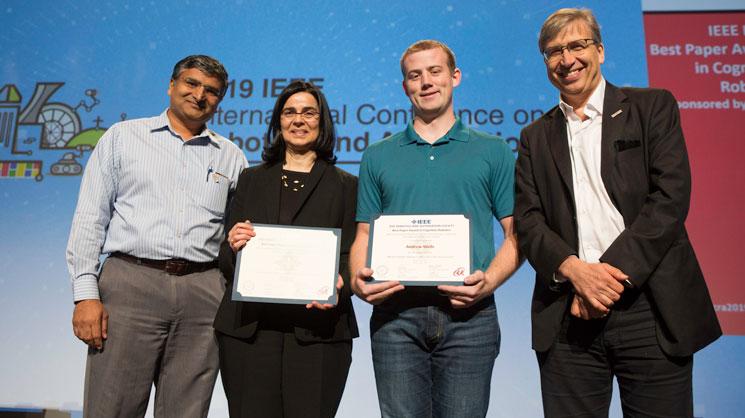The Kavraki group won a best paper award at 2019 IEEE International Conference on Robotics and Automation (ICRA) in the Cognitive Robotics category.
The paper was written by Keliang He (Ph.D. ’19), Ph.D. student Andrew Wells, Lydia Kavraki, the Noah Harding Professor of Computer Science, professor of bioengineering, electrical and computer engineering and mechanical engineering, and Moshe Vardi, the Karen Ostrum George Distinguished Service Professor in Computational Engineering, and University Professor.
ICRA is the IEEE Robotics and Automation Society’s flagship conference and the premier international forum for robotics researchers to present and discuss their work. In 2019 the conference has held in Motreal Canada and it had more than 4,000 attendees.
“Lydia and I have been collaborating for over a decade at the interface of robotics and formal methods. This award shows how productive this collaboration is,” Vardi said.
The paper, titled “Efficient Symbolic Reactive Synthesis for Finite-Horizon Tasks,” presents a scenario where a human is working together with a robot to complete an assembly task. The assembly may require many steps, and the robot needs to guarantee the completion of the assembly, despite the varying level at which the human may be involved, and even in cases where the human is counterproductive. The goal is to precompute a winning strategy to guarantee robot task completion under all modeled human behaviors.
“The core contribution of this paper is a technique to improve scalability,” Wells said.
“Essentially we show that separating the specification from the domain and representing the later using a data structures called Binary Decision Diagrams can improve performance exponentially. I think the most exciting part about this work is combining two subfields of computer science (robotics and formal methods) to improve the state-of-the-art,” he said.
The Kavraki group had a strong presence at the 2019 IEEE International Conference on Robotics and Automation. Seven members of the group traveled to Montreal to present six papers. Among them, another paper titled “Online Multilayered Motion Planning with Dynamic Constraints for Autonomous Underwater Vehicles,” with Ph.D. student Eduard Vidal as the first author, was among the three finalists for the Best Student Paper Award at the conference.
“Having two of our papers compete in the Best Paper Awards categories of such a major conference is amazing,” Kavraki said. “I want to congratulate Keliang, Andrew and Eduard for their incredible work. It is a privilege to work with them,” she said.
Cintia Listenbee, Marketing and Communications Specialist in Computer Science
Body
Kavraki Group wins best paper award at ICRA 2019
The Kavraki group won a best paper award at 2019 IEEE International Conference on Robotics and Automation (ICRA) in the Cognitive Robotics category.

